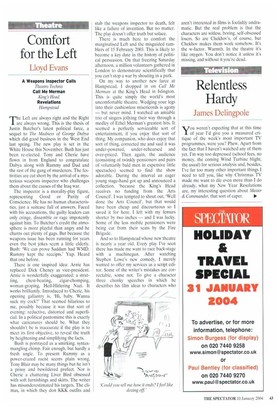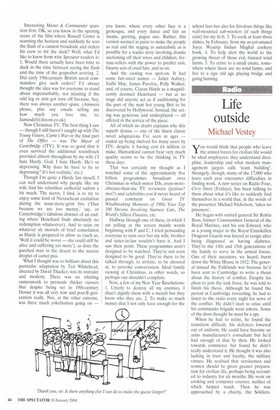Relentless Hardy
James Delingpole
you weren't expecting that at this time of year I'd give you a measured critique of the week's most important TV programmes, were you? Phew. Apart from the fact that I haven't watched any of them yet, I'm way too depressed (school fees, no money, the coming Wind Turbine blight, the usual) for serious analysis and, besides. I've far too many other important things I need to tell you, like why Christmas TV made me want to die even more than I do already, what my New Year Resolutions are, my interesting question about Master & Commander, that sort of caper. Interesting Master & Commander question first. OK, so you know in the opening scene of the film where Russell Crowe is scanning the horizon and suddenly he sees the flash of a cannon broadside and orders his crew to hit the deck? Well, what I'd like to know from wise Spectator readers is: 1. Would there actually have been time to duck in the time between seeing the flash and the time of the grapeshot arriving. 2. Did early 19th-century British naval commanders give such orders? I'd always thought the idea was for everyone to stand about imperturbably, not minding if the odd leg or arm got torn off because, hey, there was always another spare. (Answers please, plus any emails telling me how much you love me, to: Jamesdel dircon.co. uk)
Now Christmas TV. The best thing I saw — though I still haven't caught up with The Young Visiters, Canie's War or the final part of The Office — was The Mayor of Casterbridge (ITV). It was so good that it even survived the additional soundtrack provided almost throughout by my wife CI hate Hardy. God, I hate Hardy. He's so depressing. Why does he have to be so depressing? It's not realistic,' etc.).
Though I'm quite a Hardy fan myself, I can well understand why people like my wife find his relentless authorial sadism a bit much. The secret, I find, is to try to enjoy some kind of Nietzschean exultation during the none-more-grim bits (Dun because we are too menny,' say, or Casterbridge's fabulous downer of an ending where Henchard finds absolutely no redemption whatsoever). And to seize on whatever sly morsels of brief consolation as Hardy is prepared to allow us (such as, 'Well it could be worse — she could still be alive and suffering yet more'), as does the parched man in the desert to the merest droplet of camel piss.
What I thought was so brilliant about this particular adaptation by Ted Whitehead, directed by David Thacker, was its restraint and modesty. There was no whirling camerawork to persuade thicker viewers that despite being set in 19th-century Dorset it was all very now and post-E-generation really. Nor, at the other extreme, was there much yokelisation going on — you know, where every other face is a grotesque, and every dance and fair an insane, gurning, pagan one. Rather, this version seemed at pains to make the people as real and the staging as naturalistic as is possible for a wacko story involving drunks auctioning off their wives and children, fortune-tellers with the power to predict rain, bizarre acts of cruel fate, and so on.
And the casting was spot-on. It had some fair-sized names — Juliet Aubrey, Jodhi May, James Purefoy, Polly Walker, and, of course, Ciaran Hinds as a magnificently doomed Henchard — but at no stage did anyone act as if auditioning for the part of the next hot young Brit to be discovered by Hollywood. Instead, the acting was generous and underplayed — all offered in the service of the piece.
All of which no doubt explains why this superb drama — one of the finest classic novel adaptations I've seen in ages — ended up being shelved for many years by ITV, despite it having cost £4 million to make. Humankind cannot bear very much quality seems to be the thinking in TV these days.
That was certainly my thought as I watched some of the approximately five billion programmes broadcast over Christmas in which minor DJs, even-moreobscure-than-me TV reviewers (jealous? moi?) and celebrities you'd never heard of passed comment on Great TV Windbreaking Moments of 1984, Your Top 100 Sitcoms Involving Siamese Cats, The World's Silliest Flautists, etc.
Halfway through one of these, in which I sat yelling at the screen mainly words beginning with F and C, I tried persuading everyone to turn over but my wife, brother and sister-in-law wouldn't have it. And I saw their point. These programmes aren't designed to he watched. They're not even designed to he good. They're there to be talked through, to irritate, to be shouted at, to provoke conversation. Ideal family viewing at Christmas, in other words, so perhaps one shouldn't complain.
Now, a few of my New Year Resolutions: 1. Utterly to destroy all my enemies. I shan't dignify them with a mench but they know who they are. 2. To make so much money that I not only have enough for the school fees but also for frivolous things like wall-mounted sub-woofers (if such things exist) for my hi-fi. 3. To cook at least three dishes, by February, from my as-yet-unused Joyce Westrip Indian Mughal cookery book. 4. To help alert the world to the growing threat of those evil, bastard wind farms. 5. To retire to a small estate, somewhere where there are no wind farms, and live to a ripe old age playing bridge and going hunting.



























































 Previous page
Previous page